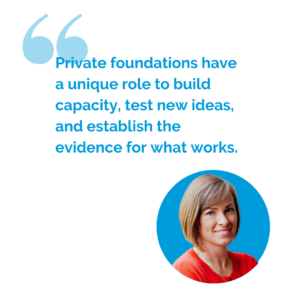It is not uncommon for human services organizations to rely heavily on public funds – grants and contracts from local, state, or federal agencies. In fact, many would argue that this is the way it should be, that it is the responsibility of the government to fund housing efforts, health services, maternal healthcare, early childhood programs, arrest diversion, mental and behavioral health initiatives, and other programs that address the needs of vulnerable members of society.
So what does this mean for fundraising from private foundations in the field of human services?
 Diversified revenues are crucial for just about any organization, creating sustainability and resilience when a funding source runs dry. While human services organizations may have a substantial public funding portfolio, and many government grants require a private funding match, this does not mean that other sources of revenue – including earned income and philanthropic funds – should take a back seat in your funding strategy. In fact, I encourage you to think differently about philanthropy and its role in supporting human services providers.
Diversified revenues are crucial for just about any organization, creating sustainability and resilience when a funding source runs dry. While human services organizations may have a substantial public funding portfolio, and many government grants require a private funding match, this does not mean that other sources of revenue – including earned income and philanthropic funds – should take a back seat in your funding strategy. In fact, I encourage you to think differently about philanthropy and its role in supporting human services providers.
Imagine you’re on the leadership team of a service provider that implements a highly effective program for returning citizens; clients successfully maintain housing and jobs, and avoid further justice-system involvement. A contract with the state Department of Justice makes up the majority of the program budget, with the balance coming from a Master Leasing initiative and one wealthy individual donor who gives annually. For the most part, the program is meeting the needs of the population it currently reaches, but there is zero capacity for expansion, innovation, or outreach.
The Board and leadership team is concerned with the long-term sustainability for the program, and next steps involve developing a strategy to diversify revenues for the organization. A discussion ensues around pursuing foundation grants as a key tactic for diversification. The leadership team considers which aspects of the program may be well-suited to private grant opportunities. Should you seek grant opportunities for direct program expenses like rent and food assistance? Or are foundations more likely to support a new outreach component focused on engaging those who are incarcerated before their release? Perhaps you should seek General Operating Support?
If invited to that debate, I would argue that public funds can and should be used for direct programmatic expenses,  whereas there may be a unique role for private foundations to provide the funding needed to build capacity, test new ideas, and establish the evidence for what works.
whereas there may be a unique role for private foundations to provide the funding needed to build capacity, test new ideas, and establish the evidence for what works.
My advice to the leadership and development teams at human services organizations: Do not primarily think of private foundation grants and other philanthropic contributions as a budget gap-filler. Consider where public funds can and should be used, and where private philanthropy can have a unique impact.
For example, social services organizations might focus philanthropic asks on:
- Well thought-out new initiatives for which you need to establish proof of concept before advocating for public investment;
- Support for concrete diversity, equity, and inclusion initiatives;
- Organizational capacity building (investments in a strategic plan, executive coach, or development strategist, for example);
- Initiatives that are crucial to your clients’ wellbeing where public funders limit their support (such as access to abortion services, gender-affirming care, or harm-reduction initiatives); and
- General Operating Support!
 Above all, the grant request most likely to be funded is the one that is aligned with the foundation’s own priorities, adheres to its proposal guidelines, and for which you have the encouragement of foundation program officers, Board members, or other decision makers to apply.
Above all, the grant request most likely to be funded is the one that is aligned with the foundation’s own priorities, adheres to its proposal guidelines, and for which you have the encouragement of foundation program officers, Board members, or other decision makers to apply.
Is your organization ready to establish (or grow) a private grants program? The team at Elevate can help! Reach out to us at hello@elevatedeffect.com to learn more about our work with nonprofits throughout the U.S. to build smart and strategic grants programs.
A version of this article was originally published in the Summer 2023 edition of The Provider Newspaper, the flagship publication of the Providers’ Council.
About the Author:

Vice President of New Client Partnerships










 Diversified revenues are crucial for just about any organization, creating sustainability and resilience when a funding source runs dry.
Diversified revenues are crucial for just about any organization, creating sustainability and resilience when a funding source runs dry. whereas
whereas  Above all, the grant request most likely to be funded is the one that is aligned with the foundation’s own priorities, adheres to its proposal guidelines, and for which you have the encouragement of foundation program officers, Board members, or other decision makers to apply.
Above all, the grant request most likely to be funded is the one that is aligned with the foundation’s own priorities, adheres to its proposal guidelines, and for which you have the encouragement of foundation program officers, Board members, or other decision makers to apply. 




